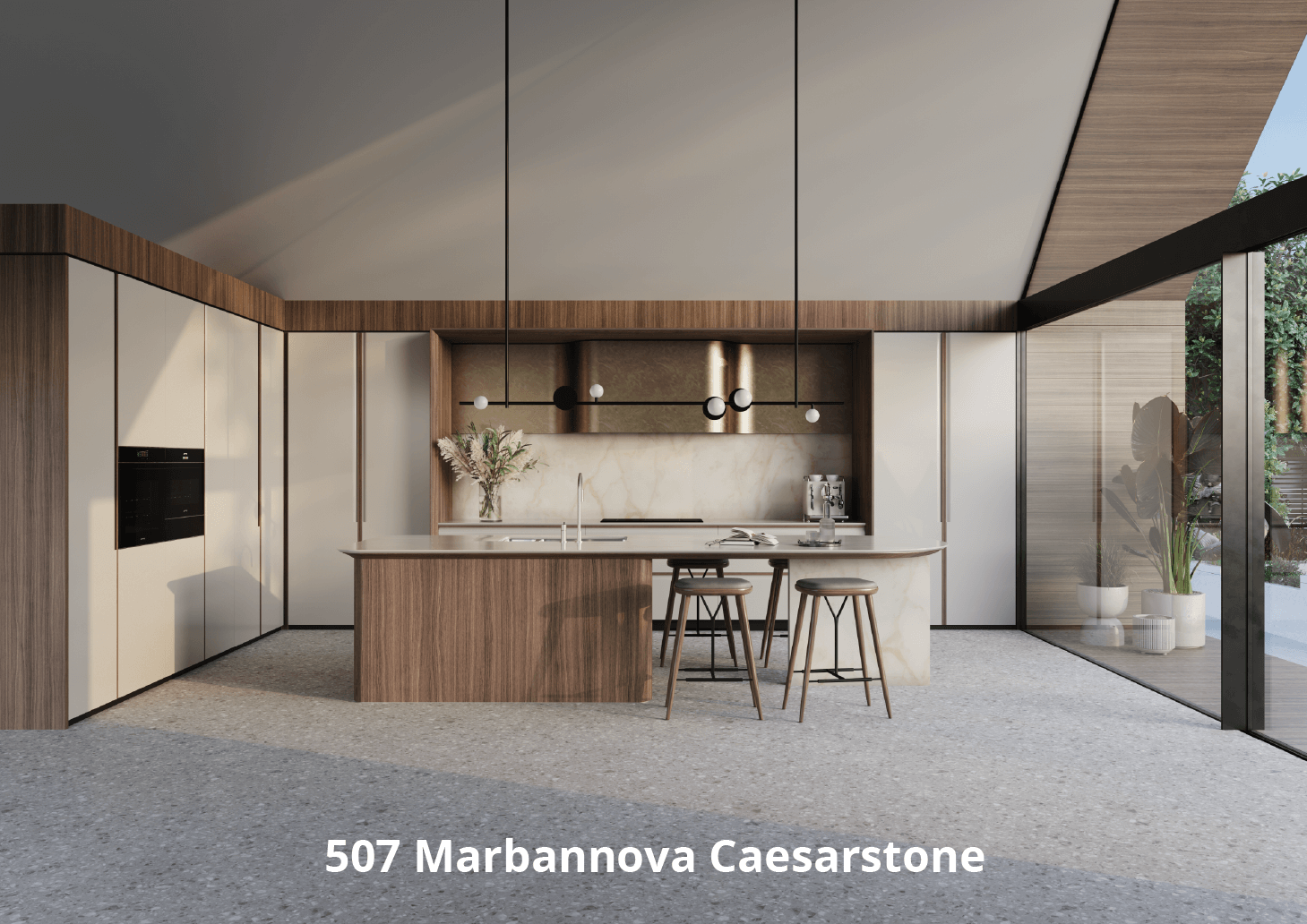Porcelain Benchtop vs Engineered Stone benchtop

So you’re at the fun part of your build where you get to choose your kitchen benchtops? If so you may have noticed the two big players; porcelain and engineered stone. Both have their pros and cons. In this comparison, we’ll go into the benefits and drawbacks and help you make an informed decision for your luxury kitchen or bathroom.
What is Porcelain?
Porcelain is a ceramic material made from clay and natural minerals. It’s fired at very high temperatures resulting in an ultra compact surface with high density and low porosity. This makes porcelain stone very durable and perfect for kitchen and scullery benchtops. Porcelain slabs are known for mimicking natural stone benchtop materials like marble, giving you a luxurious, elegant look without the maintenance of natural stone.
You can even use porcelain slabs as wall cladding for splashbacks or high-traffic areas due to their stain-resistant and non-porous surface, qualities that make it a popular choice for homeowners looking for a low-maintenance yet stylish material.
What is engineered stone?
Engineered stone is made from a combination of quartz and resin, a more affordable alternative to porcelain or natural stone. These benchtops are durable and come in many colours and finishes, replicating the look of natural materials like granite and marble, so it’s a great option for homeowners who want the look of stone benchtops without the cost or maintenance.
Aesthetic comparison
When it comes to aesthetics both porcelain benchtops and engineered stone benchtops offer a huge range of patterns, colours and textures. Porcelain slabs can mimic other materials so they’re highly versatile for any interior design style, modern or traditional.
Engineered stone while also versatile tends to have a more organic and warm look. Its polished finish can add sophistication to any kitchen but may not offer the same range of options as porcelain when it comes to mimicking other materials.
Durability and maintenance
In terms of durability porcelain is one of the hardest benchtop materials around. Its scratch, stain and heat resistance make it perfect for busy homes where multiple meals are cooked every day. The non-porous surface means you don’t have to worry about those accidental spills and requires far less maintenance over time. In fact, porcelain can last for decades without showing any signs of wear and tear!
Engineered stone while also durable may not be as heat resistant as porcelain stone. Placing hot pots or pans directly on these countertops could cause damage over time. However, it’s still relatively easy to maintain, and requires less upkeep than natural stone like marble which needs to be sealed to prevent stains.
Safety considerations
Safety is a big factor, especially with engineered stone. In Australia, there are new laws due to the risk of silicosis, a lung disease caused by inhaling silica dust when cutting or polishing engineered stone. The Australian government has introduced regulations to reduce this risk but porcelain is a safer material, particularly during the manufacturing process.
Cost and Budget Considerations
When comparing the cost of benchtops between porcelain and engineered stone, both are in the same price range. Porcelain benchtops are priced similarly to natural stone but installation is more expensive due to the specialised tools and expertise required to fit the large thin slabs. But Porcelain is much lighter than engineered stone so it reduces the weight on cabinetry, a factor that can extend its life over decades.

Key Differences
- Heat Resistance: Porcelain can withstand extreme heat, perfect for cooking areas, engineered stone may suffer from heat damage over time, better suited for bathroom or walk-in robes.
- Stain Resistance: Porcelain benchtops are stain resistant due to non-porous surfaces, engineered stone may require gentle abrasive cleaning products to remove some stains.
- UV Resistance: Porcelain is UV proof, suitable for outdoors or in areas exposed to direct sunlight. Engineered stone is prone to fading and degradation when exposed to direct sun.
- Cost: Porcelain may have higher installation costs but offers longer-term value in durability and low maintenance compared to engineered stone countertops.
Porcelain or Engineered Stone?
In the porcelain benchtop vs engineered stone debate, porcelain wins for the luxury homeowner. But for those looking for a more affordable option while getting the look of natural stone-engineered benchtops is a strong contender.
Need a hand deciding whats right for your home? Get in touch with our team today.